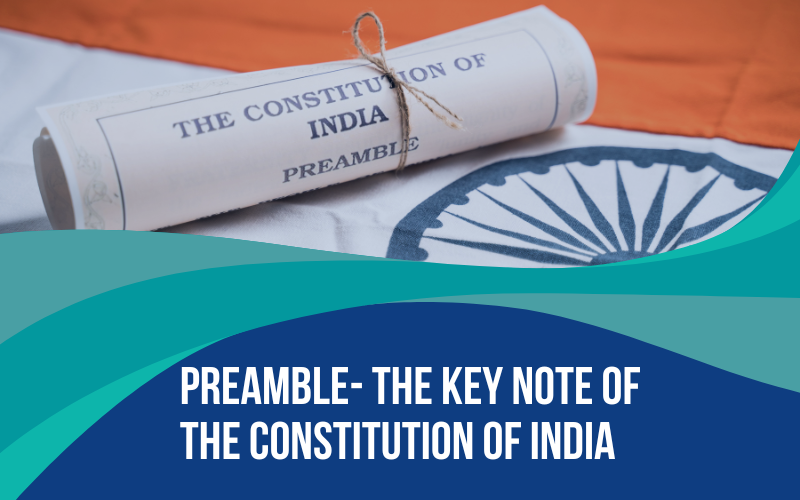
7 Preamble of the Constitution
The American Constitution was the first to begin with a Preamble. Many countries, including India, followed this practice. The term 'preamble' refers to the introduction or preface to the Constitution.
It contains the summary or essence of the Constitution. N A Palkhivala, an eminent jurist and constitutional expert, called the Preamble as the 'identity card of the Constitution.'
The Preamble :- We, the people of India, having solemnly resolved to constitute India into a sovereign socialist secular democratic republic and to secure to all its citizens; Justice, Social economic and political; Liberty of thought, expression, belief, faith and worship; Equality of status and of opportunity; and to promote among them all Fraternity assuring the dignity of the individual and the unity and integrity of the Nation;
In our Constituent Assembly this twenty-sixth day of November, 1949, do hereby adopt, Enact and Give to ourselves this Constitution
Key Words in the Preamble:- Certain keywords-Sovereign, Socialist, Secular, Democratic, Republic, Justice, Liberty, Equality and Fraternity-are explained as follows :
Sovereign :- The word 'Sovereign' implies that India is neither a dependency nor a dominion of any other nation, but an independent state. There is no authority above it, and it is free to conduct its own affairs (both internal and external).
Socialist :- Even before the term was added by the 42nd Amendment in 1976, the Constitution had a socialist content in the form of certain Directive Principles of State Policy. In other words, what was hitherto implicit in the Constitution what was hitherto implicit in the Constitution has now been made explicit. Moreover, the Congress party itself adopted a resolution to establish a 'socialistic pattern of society' in its Avadi session as early as in 1955 and took measures accordingly.
Notably, the Indian brand of socialism is a 'democratic socialism' and not a 'communistic socialism' (also known as 'state socialism') which involves the nationalisation of all means of production and distribution and the abolition of private property. Democratic socialism, on the other hand, holds faith in a 'mixed economy' where both public and private sectors co-exist side by side.
The new economic policy (1991) of liberalisation, privatisation and globalisation has, however, diluted the socialist credentials of the Indian State.
Secular :- The term 'secular' too was added by the 42nd Constitutional Amendment Act of 1976. However, as the Supreme Court said in 1974, although the words 'secular state' were not expressly mentioned in the Constitution-makers wanted to establish such a state and accordingly Articles 25 to 28 (guaranteeing the fundamental right to freedom of religion) have been included in the constitution).
The Indian Constitution embodies the positive concept of secularism i.e., all religions in our country (irrespective of their strength) have the same status and support from the state.
Republic :- A democratic polity can be classified into two categories-monarchy and republic. In a monarchy, the head of the state (usually king or queen) enjoys a hereditary position, that is, he comes into office through succession, eg, Britain. In a republic, on the other hand, the head of the state is always elected directly or indirectly for a fixed period, eg, USA.
Therefore, the term 'republic' in our Preamble indicates that India has an elected head called the President. He is elected indirectly for a fixed period of five years.
Justice :- The term 'justice' in the Preamble embraces three distinct forms-social, economic and political, secured through various provisions of Fundamental Rights and Directive Principles.
Liberty :- The term 'liberty' means the absence of restraints on the activities of individuals, and at the same time, providing opportunities for the development of individual personalities.
The Preamble secures to all citizens of India liberty of thought, expression, belief, faith and worship, through their Fundamental Rights, enforceable in court of law, in case of violation
Equality :- The term 'equality' means the absence of special privileges to any section of the society, and the provision of adequate opportunities for all individuals without any discrimination.
The following provisions of the chapter on Fundamental Rights ensure civic equality:
Equality before the law (Article 14).
Prohibition of discrimination on grounds of religion, race, caste, sex or place of birth (Article 15).
Equality of opportunity in matters of public employment (Article 16).
Abolition of untouchability (Article 17).
Abolition of titles (Article 18).
Fraternity :- Fraternity means a sense of brotherhood. The Constitution promotes this feeling of fraternity by the system of single citizenship. Also, the Fundamental Duties (Article 51-A) say that it shall be the duty of every citizen of India to promote harmony and the spirit of common brotherhood amongst all the people of India transcending religious, linguistic, regional or sectional diversities.
The Preamble declares that fraternity has to assure two things-the dignity of the individual and the unity and integrity of the nation. The word 'integrity' has been added to the preamble by the 42nd Constitutional Amendment (1976).
Significance of the Preamble :- The Preamble embodies the basic philosophy and fundamental values-political, moral and religious-on which the Constitution is based. It contains the grand and noble vision of the Constituent Assembly, and reflects the dreams and aspirations of the founding fathers of the Constitution.
Preamble as Part of the Constitution :- In the Kesavananda Bharati case (1973), the Supreme Court rejected the earlier opinion and held that Preamble is a part of the Constitution. It observed that the Preamble is of extreme importance and the Constitution should be read and interpreted in the light of the grand and noble vision expressed in the Preamble.
Hence, the current opinion held by the Supreme Court that the Preamble is a part of the Constitution, is in consonance with the opinion of the founding fathers of the Constitution.
